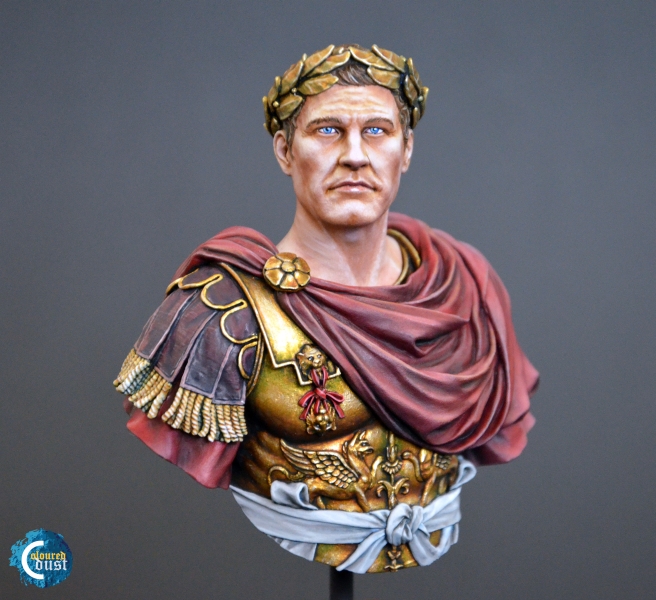
__sized.jpg)
In Greek, during Caesar's time, his name was written Καῖσαρ, which was pronounced more or less the same. (The letterform Æ is a ligature, which is often encountered in Latin inscriptions, where it was used to save space, and is nothing more than the letters "ae".) The leading vowels in each part of the name are long, and in Classical Latin, the whole name was pronounced, or, alternatively, with praenomen pronounced trisyllabically as. (That is, the s between vowels did not change to r.) Using the Latin alphabet as it existed in the day of Julius Caesar (100 BC – 44 BC) (i.e., without lower case letters, "J", or "U"), Caesar's name is properly rendered GAIVS IVLIVS CAESAR (the spelling CAIVS is also attested and is interchangeable with the more common GAIVS however the letter C was used with its antique pronunciation of, as it was an adaptation of Greek gamma). The name Caesar probably originated in Italy from a dialect of Latium which did not share the rhotacism of the Roman dialect. This sparked the final round of civil wars that ended the Republic and brought about the elevation of Caesar's great nephew and designated heir, Octavian, as Augustus, the first emperor.Gaius Julius Caesar ( Ancient Greek: ΓΑΙΟΣ ΙΟΥΛΙΟΣ ΚΑΙΣΑΡ) was a prominent name of the Gens Julia from Roman Republican times, borne by a number of figures, most notably by the general and dictator Gaius Julius Caesar. A group of these, led by Cassius and Brutus, assassinated Caesar on the Ides (15) of March 44 BC.

His success and ambition alienated strongly republican senators. Dictatorship was always regarded a temporary position but in 44 BC, Caesar took it for life. He used his power to carry out much-needed reform, relieving debt, enlarging the senate, building the Forum Iulium and revising the calendar. Caesar followed him and became romantically involved with the Egyptian queen, Cleopatra.Ĭaesar was now master of Rome and made himself consul and dictator. Pompey, their leader, fled to Egypt where he was assassinated. In the ensuing civil war Caesar defeated the republican forces. He made two expeditions to Britain, in 55 BC and 54 BC.Ĭaesar then returned to Italy, disregarding the authority of the senate and famously crossing the Rubicon river without disbanding his army.

The following year he was appointed governor of Roman Gaul where he stayed for eight years, adding the whole of modern France and Belgium to the Roman empire, and making Rome safe from the possibility of Gallic invasions. Back in Rome in 60, Caesar made a pact with Pompey and Crassus, who helped him to get elected as consul for 59 BC. In 61-60 BC he served as governor of the Roman province of Spain.

Caesar himself progressed within the Roman political system, becoming in succession quaestor (69), aedile (65) and praetor (62). His family were closely connected with the Marian faction in Roman politics. Julius Caesar was born in Rome on 12 or 13 July 100 BC into the prestigious Julian clan. © Caesar was a politician and general of the late Roman republic, who greatly extended the Roman empire before seizing power and making himself dictator of Rome, paving the way for the imperial system.


 0 kommentar(er)
0 kommentar(er)
